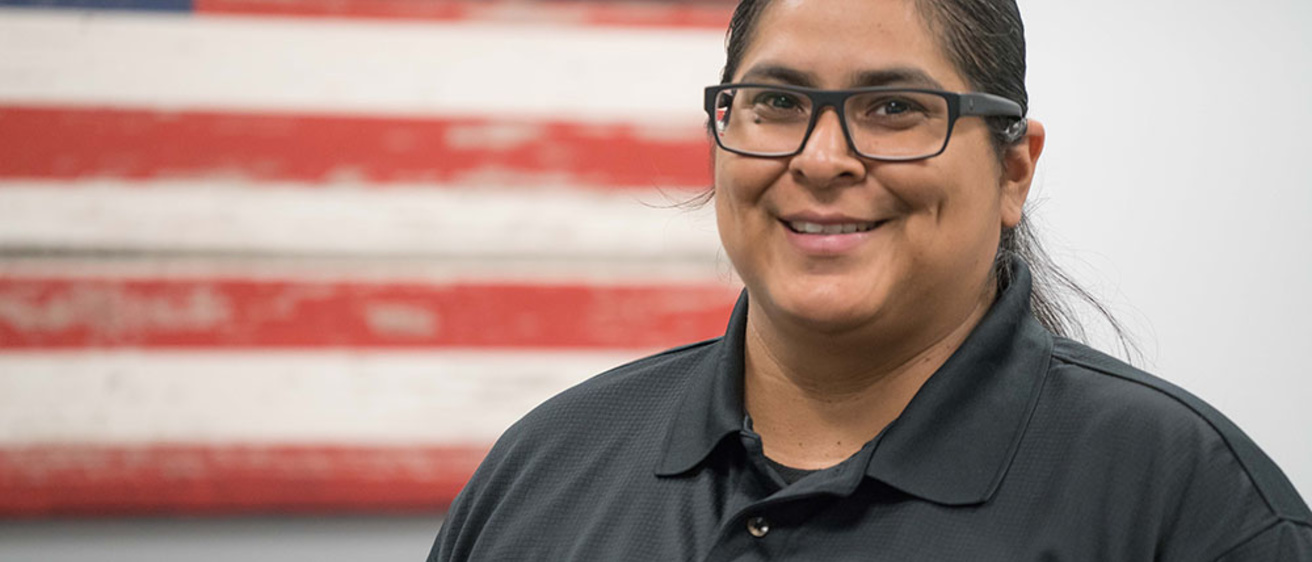By Sara Nelson Photo by Mei-Ling Shaw Williams
Building more support for female veterans is a high priority for Yareli Mendoza.
As the new veterans resource specialist with I-SERVE, which is Support, Education, Resources for Veterans and Enlisted, Mendoza seeks to build and support female veterans in higher education at the University of Iowa College of Education.
Mendoza is a doctoral candidate in the Higher Education and Student Affairs Program (HESA) Program, and her research focuses on female veterans.
She was also appointed to the U.S. Department of Veterans Affairs advisory committee on women veterans in January of 2017. See related story.
Mendoza, originally from Santa Ana, California, enlisted in the military in 2005, where she spent five years as part of the security forces branch of the Air Force. She was stationed stateside in California and primarily worked in law enforcement, where she responded to domestic violence and driving under the influence calls, and other base emergencies.
Mendoza’s unit was first deployed to Iraq in 2006, where she worked in law and order. She was a first responder for rocket or mortar attacks and was responsible for securing all impact sites and rendering medical attention until paramedics arrived. She also worked in prisoner detainee security and guarded prisoners awaiting transfer.
Mendoza was deployed to Iraq in 2008 and to Afghanistan in 2009, where she secured the base perimeter and guarded against any breaches. In addition to being a first responder, she searched incoming convoys, guarded entry points to the base, and checked personnel entering the installations.
"It is hard to discuss my experience in the military, because I wouldn't want to sway anyone from enlisting," says Mendoza. "The military taught me to be strong, and mentally and emotionally resilient, but I was not made for the military."
As a veteran, Mendoza understands the rewards and challenges of military life first-hand, and she wants to ensure that no female veteran ever feels isolated or unsupported, especially at the UI.
“The military was difficult for me. As a woman, I could never stop proving my value. It was always about being my best, and accepting that even my best wouldn't be good enough,” says Mendoza. “But I am grateful for those experiences, the good and the bad. My military service shaped my character, it taught me leadership, personal responsibility, humility, and empathy.”
Mendoza says she joined the military for its higher education benefits. However, she struggled with the transition from military to civilian life. She felt unsupported and unwelcome by the community college she initially attended and alienated by her male veteran peers.
“The veteran services on my campus were unwelcoming, and the male student veterans were dismissive of me and my service,” Mendoza says. “I spent my first two years at my community college with little social interaction with my peers. I felt isolated and alone. I often questioned if I made the right decision leaving the military to pursue higher education.”
After transferring to California State University, Fullerton, Mendoza became involved in a women’s veteran group at the university. There, she discovered a community of supportive female veterans who shared similar experiences at previous institutions. This inspired Mendoza to pursue research on women veterans.
Mendoza came to the UI after seeing the College of Education’s presence at the Association for the Study of Higher Education (ASHE) conference. After seeing the college’s unique and comprehensive program for veterans, I-SERVE, she knew that the UI would be the best place to give her new opportunities and challenges.
“The diverse faculty and research interests solidified my decision,” says Mendoza. “Once I visited the campus and met with faculty, I knew that the University of Iowa College of Education would be the best choice. All of the faculty were so supportive and approachable.”
Mendoza is currently working on a workshop series to educate pre-service teachers on working with military families. This will help bridge the gap of understanding between civilian educators and military personnel.
“I feel supported in every aspect,” Mendoza says. “It’s very different from a master’s program, where you are a consumer of education. Here you are a creator of education. The faculty here is extremely supportive. All you have to do is ask.”
Mendoza would also like to create a program for women veterans at the College of Education. There are 575 student veterans enrolled at the University of Iowa, and 219 are female. There are 15 veterans enrolled in the UI College of Education, five whom are female.
“Research indicates that unlike male veterans, female veterans state that maintaining relationships and connections with others that share their identity is important to their daily lives. Providing a space for women veterans to come together and share experiences, support, and connection meets that need,” says Mendoza. “My hope is that undergraduate and graduate UI women veterans can come together and provide each other the support that not only the literature indicates they want and need, but that I benefited so much from.”
Mendoza looks forward to spending the rest of her time as a doctoral candidate with I-SERVE, where she is working with fellow HESA doctoral student Jeremy Williams until he graduates in May of 2018. In the future, she would like to become a dean of students.
“The greatest lesson the military taught me is that failure is a state of mind. There’s a saying, ‘Adapt and overcome.’ You figure it out and you keep moving forward,” says Mendoza. “I am grateful for my experiences in the military, and I am grateful that my service has allowed me to pursue higher education. I am the first in my family to continue my education past a Bachelor of Arts, and there is no doubt in my mind that the military played a significant role in allowing me to come this far.”
